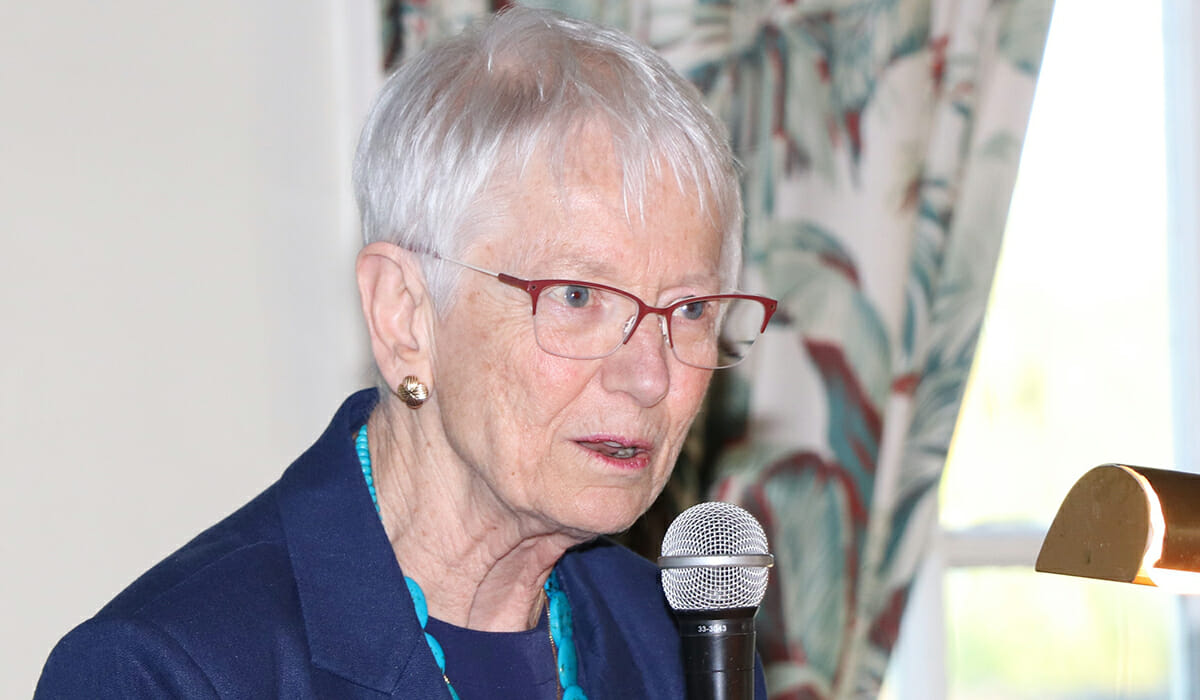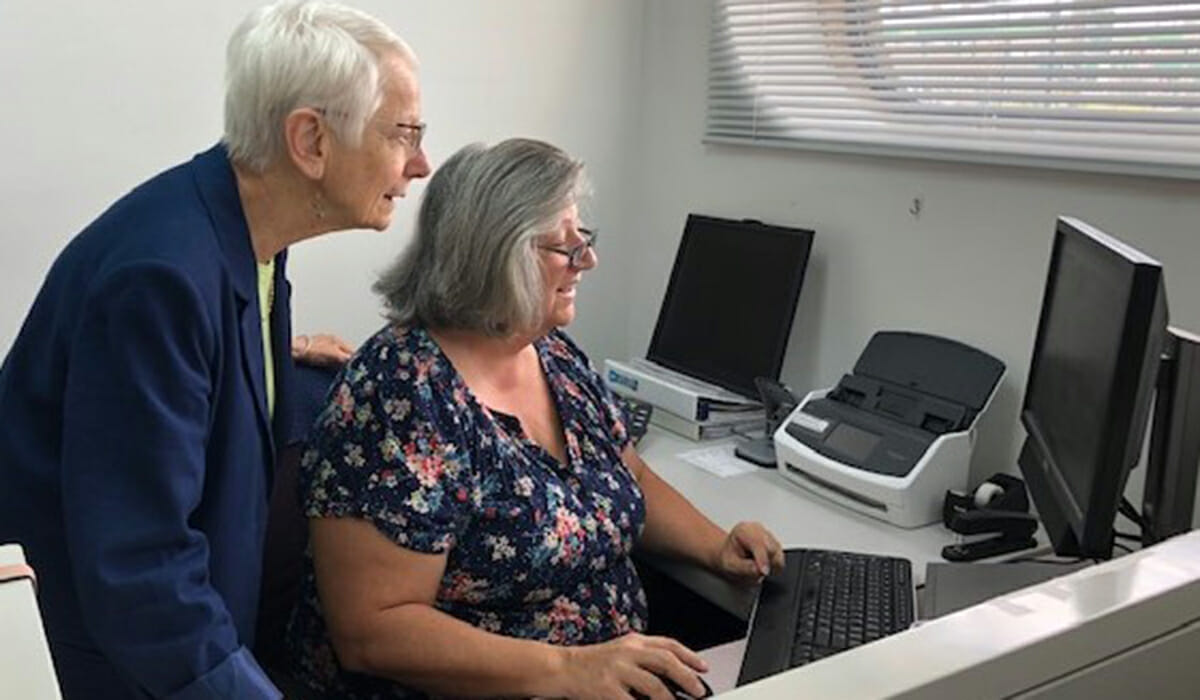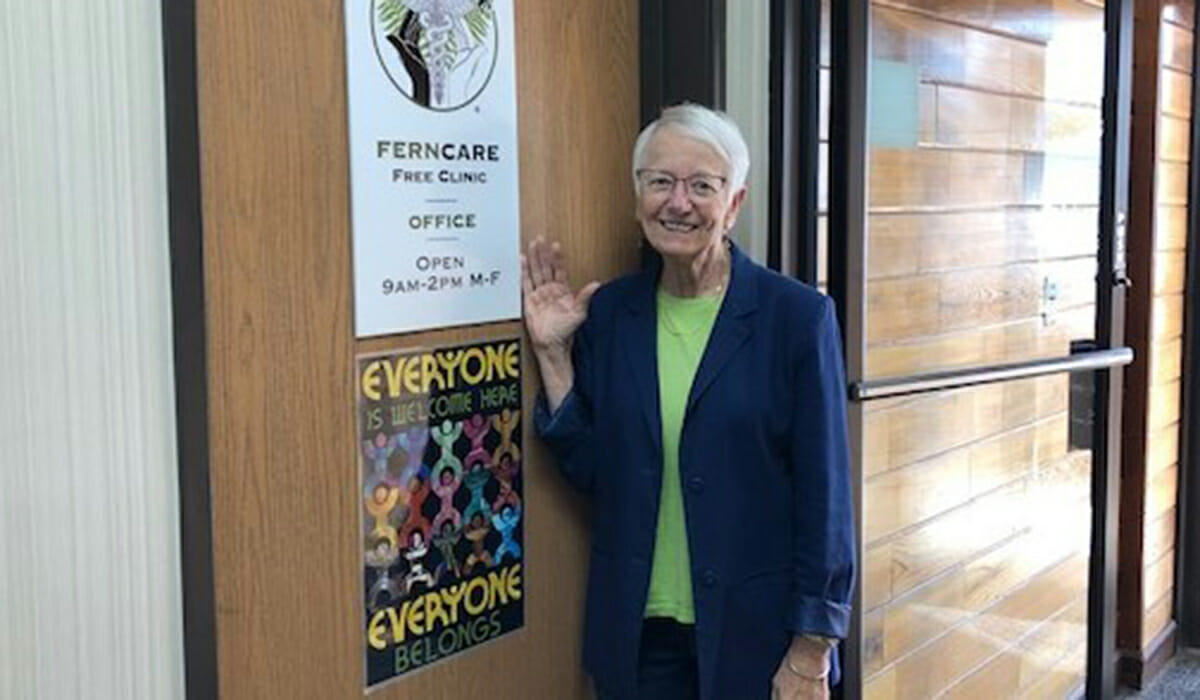Woman Cofounds Free Medical Clinic to Serve Community Members in Need of Healthcare

Meet Daily Point of Light Award honoree Ann Heler. Read her story and nominate an outstanding volunteer or family as a Daily Point of Light.
Ann Heler was sitting around a kitchen table with a group of her fellow service-minded friends, wondering out loud together what project they could take on to benefit their Michigan community. An offhand comment led to a lightbulb moment about the need for a free health clinic for citizens unable to afford healthcare. Despite the fact that none of them had any experience in medicine, the group opened their first clinic within four years of their initial discussion. Over a decade since that meeting, Ann has now served as the co-founder and Executive Director of the FernCare Free Medical Clinic for the past nine years.
The medical clinic has 390 established patients of adults who have received healthcare that they otherwise would not have been able to afford, and 110 volunteers who have donated their skills and expertise to helping them. Each month, FernCare holds six clinics that each usually see about 20 to 30 people. Aside from traditional primary care, FernCare also offers access to acupuncture, nutritionists, dietitians, counselors, collects no longer-used medications and equipment, and serves as the second-largest source of healthcare information in the Detroit metropolitan area.
“What I tell the board and what I tell all the volunteers is that we’re not doing everything,” Ann said. “We’re not solving all the problems, but we’re part of the solution because we’re doing something.”
Describe what the FernCare Free Medical Clinic does.
We’re a free medical clinic open to anyone between the ages of 19 and 64 who does not have health insurance. We don’t care about how much money you make and we don’t care about residency, none of that is important. We are a primary care clinic, so think of everything in a traditional primary care medical clinic, that’s what we do. In addition to that, we dispense generic medications, we do all of your lab tests. We always have somebody who works on, if you need a prescription that is not generic, helping you find the cheapest, if not outright free, medication possible for your issue. … At the same time we always have a health insurance enrollment volunteer at every clinic to help people figure out if in any way they qualify for health insurance. We’re wonderful and we’re pretty magnificent, but we only run six clinics a month, and the only time there’s medical staff is when we’re there, so we try really hard to get people into traditional health insurance so if they need help at 3 o’clock in the morning, it’s there at 3 o’clock.
In addition to that, we also run acupuncture for our patients that’s at a separate time than the clinics. We also have counseling. We are also the second largest source of healthcare information in the Detroit metropolitan area. Our resources are pretty niche, meaning when you call us like for a dentist for instance, we just don’t give you every dentist in your zip code. We only give you the dentists who have possibly outright free care for charitable patients, or have great payment plans, or sliding scales based on your income. It’s a very, very specialized list, and now we do 18 areas like that. We are also a collection site for no longer used medications and we work in conjunction with Ferndale Police and the DEA, because the job is to get no longer-used medications out and safe to be disposed of. We also collect medical equipment from people who no longer need it but obviously don’t want to just throw it away. That’s in conjunction with World Medical Relief and we take all of that equipment over to them and they distribute it all over the country and internationally.
We have a nutritionist, a dietician, and a wellness coach who all the patients can access if they want. With those wonderful volunteers, they can see you at the clinic, they can see you at their home, wherever you need to go. There’s a big belief at the clinic that all these things are super important and we have to help people understand that they are really, really valuable. You really can make healthy decisions and help get to where you need to go and help lessen the use of medications.
There are only three paid part-time staff. Everyone else, including the medical director, including me, including all of the medical volunteers and everyone else, are all volunteers. There’s about 110 of them all together. It’s incredible. I’m amazed every time we open clinic. We are also a teaching clinic. We have contacts with the local universities … So we take people who are just beginning to come into the field and show them a different kind of care and different kinds of things we do when you’re working with this particular population, a population that does not have a lot of money to spend, and absolutely has to do this all on their own because of course they don’t have health insurance.

Describe your volunteer role with FernCare Free Medical Clinic.
I’m one of the founders. That was 12 years ago in November 2007. Our first board meeting was in 2008. In 2010, we opened up our first clinic so I’ve been the Board President and the Executive Director since then, and then since leaving Board President last year, solely as Executive Director of the clinic.
The job [of Executive Director] is to keep the whole thing running smoothly, meaning everything from making sure our board is clear about what they need to do, and helping them in any way with what they need to do, especially around fundraising, around donors, around things like this. The next is to make sure the clinic manager and medical director have absolutely everything they need to run the clinic, to orientate new volunteers. Then, of course, just running the business and keeping the lights on and doing all those kinds of things you just have to do. We’re small, there’s only an office manager and myself when there’s no clinic. Kind of everything from looking through things people donate to make sure they can all go to World Medical Relief, to answering questions of people who just come by and have no idea what in the world a free medical clinic is and what in the world we do, and all the way up to helping to create budgets.
What inspired you and your co-founders to start the clinic?
Ferndale, Michigan is very community-minded and also a very, very politically active community. In 2006, a group of us [were involved with] Citizens for a Fair Ferndale. We had just passed the human rights ordinance. Now it’s 2007 and the five of us were sitting around thinking what are we going to do, what’s our next project? Two of the people happened to be independently health insured … One of the couple, she was opening her mail and she just received her insurance bill and she put it out in front of all of us and said, what do people do that can’t afford this? And I said, well, let’s start a free clinic. Our first board meeting was in April 2008, in 2010 we opened our first clinic. We’re still going, no end in sight. We’re still trying to think of another way to add one more clinic session, one more service, one more thing we can do.
I like to talk about it, I like to talk about the people and great patients, but it’s really sad that we have to use free clinics in this country for medical care. There’s about 1,400 free clinics in the whole country. Michigan has 49 clinics and they’re all over the state. The fact that we have not found out a better way to take care of healthcare issues and to take care of our country’s health — we just have to keep working on it. We just have to keep talking about some alternatives and other kinds of things we can do.
What would life be like for your patients if they didn’t have access to the clinic?
First of all, if they don’t have healthcare, for most of our patients, they’re going to die a lot earlier than they need to or should have or would have. The issues are real, it’s not just a headache, it’s not just a head cold. People come with us with hard, hard issues. Hard diabetes issues, blood pressure issues, that some of them, because they’ve lived with it for so long, they don’t even know how at risk they are. People who know something is wrong and know they need medical care that can’t afford it in our area. … Or they’ve been to the hospital before and they had dreadful, dreadful bills. They cannot access healthcare. They can’t afford it, so they live in misery. The number of people who live with damage, oh my goodness. First of all, if you have a toothache all the time, you’re not going to be the most cheerful person in the world. If you’ve got a headache that you feel is just exploding, you’re not giving full attention to anything except that headache. So what are we missing? These people, the family isn’t getting the attention they need, the job isn’t getting the attention it needs if they work, and it’s pretty frightful and they live kind of on a tightrope all the time. They know they’re ill, they can’t afford to miss work at all, so they don’t want a diagnosis that says they may have to. They don’t want that, but they know they need this issue handled. Most of these issues don’t go away just because you wish it so.
So when they come to the clinic and somebody says, ‘this is what you’ve got and this is what we’re going to do, and you’re going to see this and you’re going to try this,’ they change. When they walk out, you can just see their shoulders drop. Maybe not forever, but at least for now. For now, ‘I didn’t make all this up, somebody believed me, it looks like I’m going to get help, they’ve started some kind of plan. This, at least, might be ok.’
I’m very fortunate that I have health insurance and all of that. I can’t imagine being in a position where there’s nothing you can do so you just have to get up and go to work and try to get through the day. This helps in this area, in this one area of a physical or a mental issue, just knowing that this part is being handled, it’s a little better. It won’t solve all your problems, but at least this one little thing, now they can be easy on. Seventy eight percent of our patients work. Of that 78 percent of patients that work, about 63 percent [make] 32,000 dollars or less a year. So they don’t have a lot of money, you know. You can see why some things are just not possible for them.
Are there any future partnerships, programs, or events that you are excited about?
We have just inaugurated an electronic medical system for the clinic. We’ve been on paper charts up until May. The volunteers are just beginning to get used with that. As soon as the medical director gives me the go, we’re going to incorporate a patient portal so we will have one more way of being able to reach patients and also one more way for patients to find out about their heath status, about the latest report, about the latest appointment, whatever it is. Just one more service to help our patients get the best care they possibly can and then to do as much as they can working on their own health. That will be by next spring.
Another thing we hope to do is to offer counseling services that would be available to a number of our clinics. It’s one thing to have two or three social workers who can help and who can make appointments, but that is not a dent in what is needed around mental health, emotional health, and so on and so forth. We’re beginning to piece that together so we can open that as a new flourishing service in 2020.

What’s been the most rewarding part of your work?
One is seeing patients leave with big smiles on their face, like ‘I don’t have to worry about my insulin. I don’t have to worry about my blood pressure count, because now someone is helping me with this. This is one less thing I have to worry about. One less thing.’ What a pleasure to see that, what a pleasure. … That’s a lot and that makes me happy.
The other is working with these incredible volunteers. There’s no reason to come here, you know, nobody twists their arm, nobody begs, I don’t follow them around crying. They volunteer. All of these people, they all have licenses, they all have certificates, everything that is required by the state of Michigan to work in a clinic. They see people who are licensed by the Michigan Board of Health. The clinic, we maintain our license, our pharmacy license, we’re clean to Michigan’s hospital standards. Our clinic matches any clinic or hospital in the state of Michigan. So it’s not just people coming in with a donut in one hand and willing to sit down with you in the other. No, this is a real clinic. These people come after working all day or all night and they continue to do the great work they do. They’re incredible.
Obviously because we’re such a small clinic, you think of a hospital’s resources or a big clinic’s resources, of course we don’t have that. But if there’s something a patient needs that we don’t have — I can’t say how many times we’ve seen staff consult together to figure out who knows who, or who could know who, and could they call who, to see if they could see this patient. They don’t have to do that and they do time and time again. They’re just extraordinary. An extraordinary bunch of people. It makes you just want to do more. Just think, I can fit in a couple more hours, I can do a little bit more, because these people are such role models. Their skill is one that not a lot of people have and they’re willing to do it for free.
Also, it doesn’t get done for five dollars a day. This is a medical clinic, nobody wants a medical clinic on five dollars a day. Yet I am happy to tell you, we just celebrated our ninth year offering medical clinics. We have never closed because we didn’t have money to get through the month or because we ran out of volunteers, never, ever.
What do you want people to learn from your story?
If you want to do something, you can do it. Five people with no experience in medicine at all, opened a free clinic and have kept it going for nine years. We did it and you can do it. If you want it, you can do it. I always like to ask people when I speak at things like that — I know what you do during the day, I know what you do to earn your money … I always like to go around and ask what is it you would like to do? What do you want to work on? Is it trees? Better daycares? What is it? You should just start. Just get some people together and start. Because we’re an example of what happens when you do. You’re doing something that’s helping. Not the whole world maybe, but that’s ok. You’re not just taking up space, you’re doing something. That’s what I would say, what do you think needs to be done? What’s your project? What do you do? What do you think? What’s needling you, what’s bothering you? I bet you can think of a way, I bet you can start something.
Do you want to make a difference in your community like Ann? Find local volunteer opportunities.
